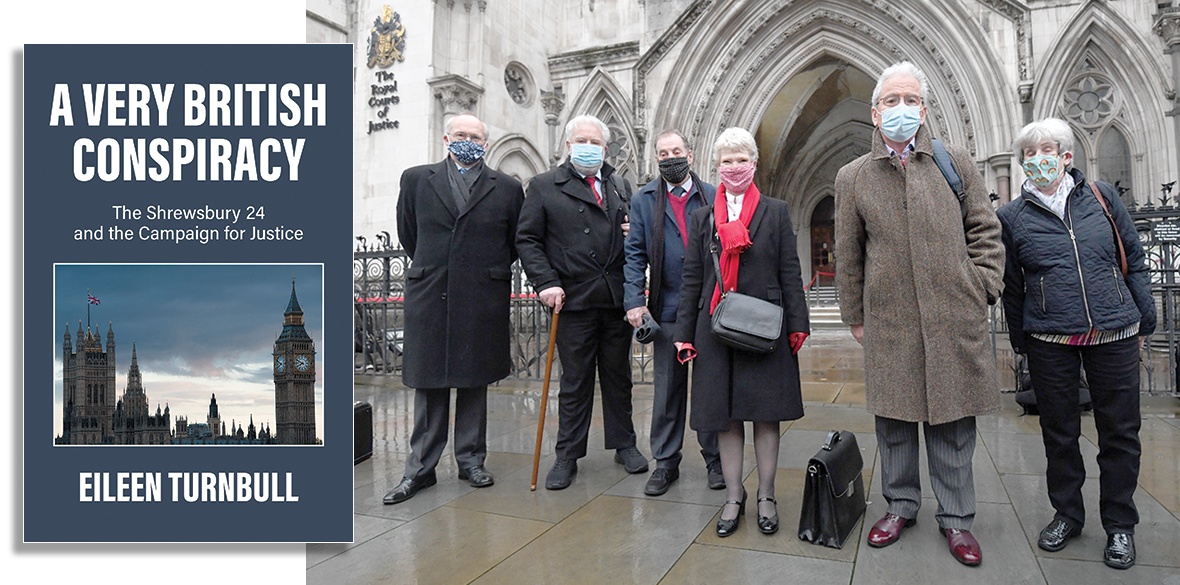This is the last article you can read this month
You can read more article this month
You can read more articles this month
Sorry your limit is up for this month
Reset on:
Please help support the Morning Star by subscribing here
A Very British Conspiracy – The Shrewsbury 24 and the Campaign for Justice
By Eileen Turnbull
Verso £16.99
EILEEN TURNBULL is one of those extraordinary working-class heroes who should be honoured by their country but in our class-riven society rarely are.
In 1972 building workers in Britain went on strike for the first time ever for better pay, safer working conditions and an end to the Lump (zero-hours contracts and lump sum payments) which was rife in the industry.
The strike came in the wake of other big industrial disputes, including the successful miners’ strike of 1972. The building workers were also successful in terms of winning concessions from the employers and in building union membership. Some of the big companies like the McAlpine conglomerate were determined to take revenge for their defeat.
The main focus of the three Shrewsbury trials was a single day’s picketing in September 1972. Five months after the strike had ended, a total of 243 charges were laid against 24 of the over 200 flying pickets out on that day for offences that were alleged to have taken place.
The charges were: unlawful assembly and affray but also conspiracy, under the archaic Conspiracy and Protection of Property Act from 1875! It is an outrageous irony that the real conspiracy here was between the Tory government, big construction bosses and the police, but it would take Turnbull and her small band of intrepid co-workers almost half a century to reveal that truth and, in the end, achieve justice.
On September 26 the Shrewsbury pickets and their families were finally able to celebrate the magnificent victory at the Court of Appeal on March 23 2021 when all convictions were quashed.
The construction industry has always been a big financial supporter of the Conservative Party nationally and locally, as the granting of most big building contracts are in the hands of governing political parties.
Although the strike was official, the traditionally conservative building workers’ union was a reluctant participant rather than leader. The strike momentum was driven by grassroots members.
It was no accident that the conspiratorial action by the state was taken against a poorly organised and scattered workforce in the north-west and Wales, far from traditional trade union industrial heartlands. Shrewsbury, where the court sat, was difficult to get to and organise solidarity action.
Once these workers were charged, a grassroots campaign began to demand they be dropped.
After sentencing the campaign demanding their release gained a new lease of life. It was also no accident that those given the heaviest sentences were Des Warren, a leading and charismatic lay activist and Communist Party member, and Ricky Tomlinson.
Warren was sentenced to three years in prison, Tomlinson two years and McKinsie Jones nine months. For all these men, the consequences of the trials was mass blacklisting and, for many, long-term unemployment, family trauma and ill-health.
Both the TUC and the leaderships of the big unions were reluctant to get involved in the campaign, with the excuse that the sentences were for criminal activity.
Eileen Turnbull, who was married to a building labourer and knew of the terrible conditions under which the men had to work, began campaigning for justice in 1972, little realising that it would take over decades of her life.
In the meantime she gained an MA and PhD in the course of her intensive research in government files, trade union minutes, police reports and much more. An amazing achievement.












